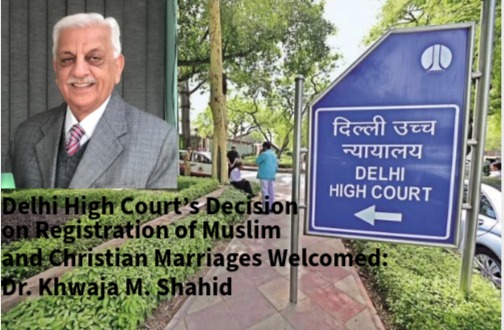Delhi High Court Orders Government to Provide Options on Online Portal
19 Jul. 24: Dr. Khwaja M. Shahid, President of All India Educational Movement (AIEM) and former Pro-Vice Chancellor of MANUU, has welcomed the Delhi High Court’s decision directing the Delhi government to enable online registration of marriages, including Muslim and Christian marriages, under the Mandatory Marriage Registration Order, 2014. He described the decision as crucial for the democratic social fabric of the country. He also mentioned that AIEM, in collaboration with Supreme Court Advocate Aslam Ahmed, Delhi High Court Advocate Rais Ahmed, and others, conducts awareness programs on such issues every year.
Justice Sanjeev Narula, in his ruling, emphasized the need for providing an option for such registrations on the portal to ensure an easy administrative process for the public. Despite assurances given by officials in 2021 regarding marriages, no alternative procedure, either online or offline, has been provided for registering marriages under Muslim Personal Law or Christian Personal Law, which the court termed as an “institutional failure.”
It is noteworthy that the court issued this order in response to a Muslim couple, married in 1995, who faced difficulties in obtaining a marriage registration certificate under their religion when they needed to join their children living abroad.
In his press statement, Dr. Shahid shared that his own son encountered this problem when he needed to travel abroad. Due to the limited options on the Delhi government’s marriage registration portal, which only offered Hindu Marriage Act and Special Marriage Act options, his son had to register under the Special Marriage Act.
He further explained that registering Muslim and Christian marriages under the Special Marriage Act, 1954, causes problems for families in matters like property division under their personal laws. He expressed hope that the court’s decision to update the portal options will be a significant step in protecting the constitutional rights of minorities. However, he raised an important question about the fate of previous registrations and whether those people will need to re-register. He urged the government to address this issue as well.
Dr. Shahid also pointed out that many Muslim organizations need to undertake such crucial welfare work but, unfortunately, are not doing so. He cited the example of the India Islamic Cultural Centre in Delhi, which has not addressed this significant legal issue affecting Muslims despite being in the capital.




